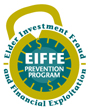
Serve Our Seniors is a resource-rich site about regulatory, legal, and policy issues regarding the nation's senior citizens. It is a project of the North American Securities Administrators Association, comprised of securities regulators in the 50 U.S. states, the District of Columbia, provincial regulators in Canada, and in Mexico and Puerto Rico.
 A Guide for Seniors: Protect Yourself Against Investment Fraud, from the Securities and Exchange Commission. How? Ask questions and check out the answers. Know the salesperson. Take your time -- don't be rushed into a decision. Be wary of unsolicited offers. Never judge a person's integrity by how he or she sounds. Watch out for salespeople how prey on your fears. Question why you cannot retrieve your principal or cash out your profits. And never be afraid to complain.
A Guide for Seniors: Protect Yourself Against Investment Fraud, from the Securities and Exchange Commission. How? Ask questions and check out the answers. Know the salesperson. Take your time -- don't be rushed into a decision. Be wary of unsolicited offers. Never judge a person's integrity by how he or she sounds. Watch out for salespeople how prey on your fears. Question why you cannot retrieve your principal or cash out your profits. And never be afraid to complain.
Money Smart for Older Adults is an instructor-led program developed jointly by the Federal Deposit Insurance Corporation and the U.S. Consumer  Financial Protection Bureau. The program is designed to increase awareness among older adults and their caregivers on how to prevent elder financial exploitation and to encourage advance planning and informed financial decision-making.
Financial Protection Bureau. The program is designed to increase awareness among older adults and their caregivers on how to prevent elder financial exploitation and to encourage advance planning and informed financial decision-making.
The seven segments cover the following topics:
- Common Types of Elder Financial Exploitation
- Scams Targeting Veterans
- Identity Theft
- Medical Identity Theft
- Scams that Target Homeowners
- Planning for Unexpected Life Events
- How to Be Financially Prepared for Disasters
The ABCs for APS Professionals: How to Identify and Report Investment Fraud suggest three steps that adult protective services workers and other regulatory employees can take to safeguard the financial assets of seniors. The brochure encourages protective agencies to recognize the scope of elder financial fraud, identify the red flags of investment fraud, and know how to report suspected cases of fraud to securities regulators.
 The Elder Investment Fraud and Financial Exploitation: Patient's Brochure offers potential trouble spots which older Americans can consider as they try to assess their ability to manage their finances, such as, "I don't understand financial decisions that someone else is making for me," or "I can't reach my financial adviser."
The Elder Investment Fraud and Financial Exploitation: Patient's Brochure offers potential trouble spots which older Americans can consider as they try to assess their ability to manage their finances, such as, "I don't understand financial decisions that someone else is making for me," or "I can't reach my financial adviser."
Clinician's Pocket Guide on Elder Investment Fraud and Financial Exploitation is a pocket guide for health care workers to identify:
- The red flags of financial fraud in a patient's or client's history;
- Warning signs from clinical observations;
- Questions to ask about the financial capacity of a patient or client; and
- The types of referrals and resources available to assist the patient or client.
The Texas Department of Family Services' It's Everyone's Business site provides resources to prevent adult abuse and exploitation, including an Adult Abuse Prevention Kit.
